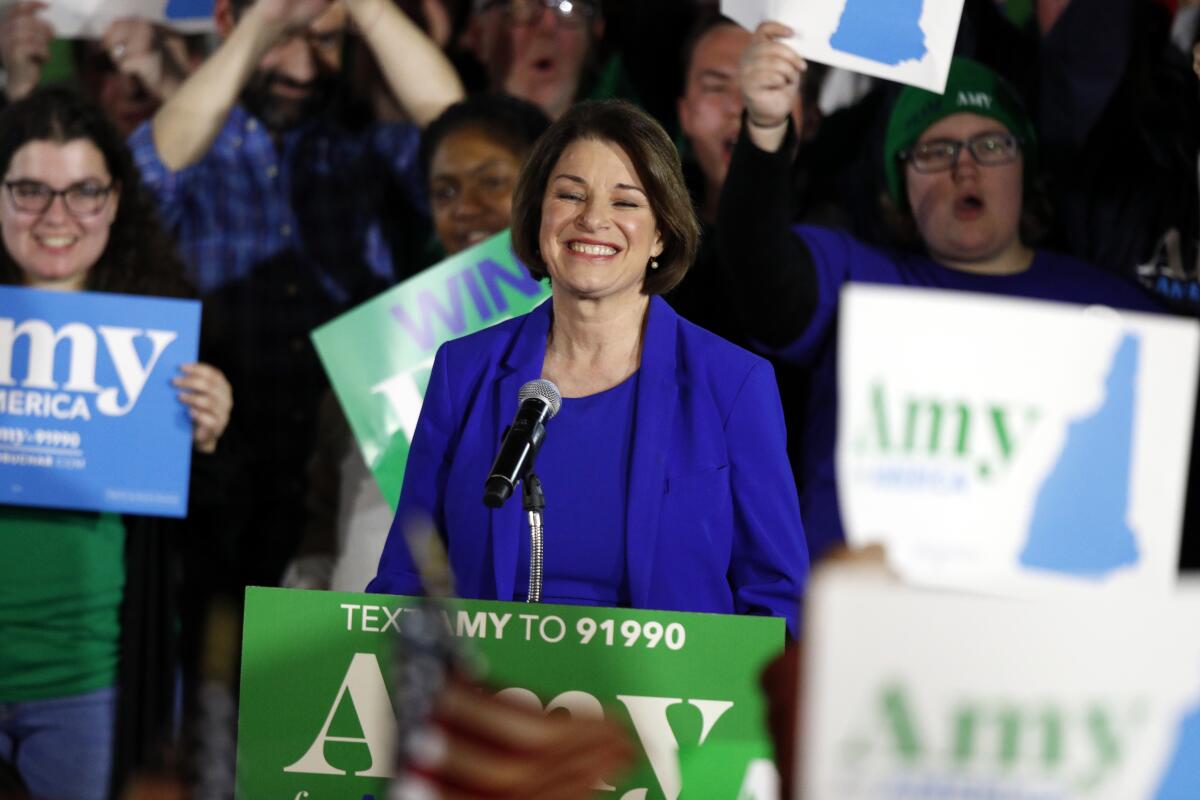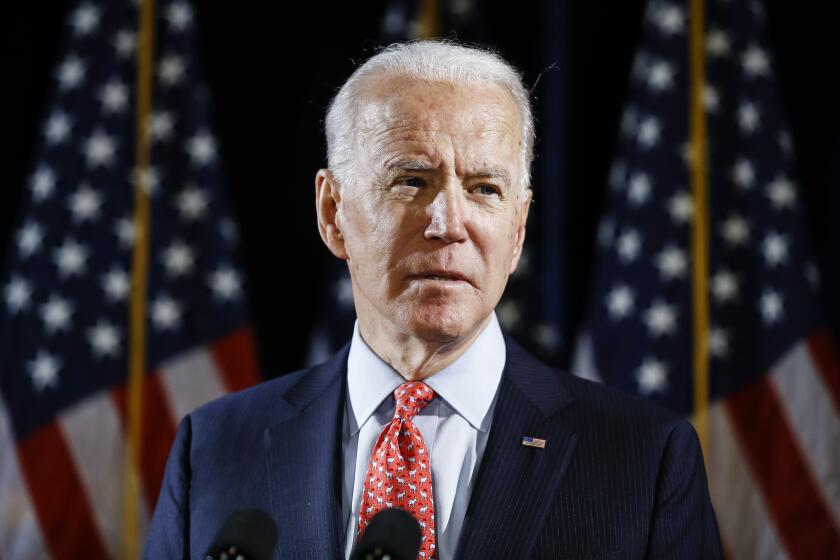Amy Klobuchar, New Hampshire’s surprise finisher, faces big challenges keeping her momentum alive

- Share via
MANCHESTER, N.H. — Amy Klobuchar’s surprisingly strong third-place showing in New Hampshire’s Democratic presidential primary catapulted the long-shot candidate into the top tier — and a new phase of campaigning that will test her shoestring operation.
The little-known Minnesota senator, counted out and mired at the bottom of the polls for months, on Tuesday managed to beat far more prominent politicians through campaigning hustle, a message of progressive pragmatism and a lean but effective organization.
A reckoning is coming, however.
Nevada and South Carolina, the next two states that vote this month, have large numbers of minorities, in contrast with the overwhelmingly white electorates for the opening Iowa and New Hampshire contests. That poses a challenge for Klobuchar, a former prosecutor from a mostly white state who has seen little support in polls from people of color.
She benefited in New Hampshire from support among the state’s many white college graduates, especially women, according to exit polling. Yet Nevada and South Carolina do not have nearly such high proportions of college graduates, suggesting they could be less hospitable to her.
Following those two battlegrounds, more than a dozen states vote on Super Tuesday, March 3, including California — a challenge for all the candidates but certainly for Klobuchar, who lacks the deep pockets and multistate infrastructure of some rivals. All the while, she is likely to face heightened attention to her record.
Even so, her strong close in New Hampshire illustrated how unsettled the 2020 Democratic contest remains. Without a clear front-runner for the party’s nomination, Klobuchar continues to have an opening, and her new place in the top tier could translate into more money, staff and volunteers.
She has clawed her way into a particularly fluid competition among the field’s moderate candidates, led so far by former South Bend, Ind., Mayor Pete Buttigieg. They are fighting to emerge as the principal alternative to Vermont Sen. Bernie Sanders, who consolidated his position as the top candidate of the party’s left wing with his narrow victory in New Hampshire.
Klobuchar’s immediate challenge is in Nevada, whose caucuses on Feb. 22 require a big investment in organizing clout to get voters to commit to the time it takes to participate.
“She’s going to make her presence known, but in terms of the moderate lane, Pete has been working on that for some time,” said Rebecca Katz, a former aide to Nevada’s premier Democratic power broker, former Senate Majority Leader Harry Reid.
Still, Katz warned, “It’s a wacky race and hard to predict.” And Klobuchar must be taken seriously, she said, after going from a poor fifth-place showing in Iowa, next door to Minnesota, to winning double the votes in New Hampshire of all the Democrats who finished behind her.
The field is down to Joe Biden now that Bernie Sanders ended his presidential campaign. Here is the Democrat heading for a battle with President Trump.
Klobuchar on Wednesday announced a seven-figure ad buy in Nevada to air two spots that highlight her promise to restore “decency” in a post-Trump era.
“We have a president who thinks everything is about him. His tweets, his golf courses, his ego,” she says, speaking directly to the camera. “ I’ll be a president and a commander in chief who restores decency to the White House and gets things done for you.”
But she has much organizing to do in a short amount of time. And as she’s come into the spotlight, her record as a senator and a prosecutor is facing greater scrutiny.
In interviews even before New Hampshire’s results, she has been grilled about her office’s prosecution of a black teenager put in jail for life whose guilt is now in question after an investigation by the Associated Press, and about her failure to prosecute police officers who used deadly force. On Wednesday, video circulated of Klobuchar speaking in support of a U.S.-Mexico border fence in 2006, during her first Senate campaign.
In building her operation in Nevada and beyond, Klobuchar is counting on the kind of fundraising boost that often follows an impressive finish in the early-voting states.
According to her campaign, she raised $4 million since Friday, after a Democratic debate for which she was widely praised, and another $2.5 million in the hours after the polls in New Hampshire closed. By comparison, Klobuchar had just $5 million cash on hand when the year began.
Still, Buttigieg and especially Sanders have significantly more in their war chests. The treasuries of all the candidates are dwarfed by the personal wealth that billionaires Tom Steyer and Michael R. Bloomberg have been spending since each joined the race late last year.
With more money, nearly all of Klobuchar’s rivals have a head start in staffing, organizing and advertising in the battleground states ahead.
In Nevada, for example, Sanders has the most expansive ground operation. His campaign said it has more than 250 staff members there in 11 offices. Buttigieg has 100 people. Klobuchar, by contrast, hopes to have more than 50 staffers in Nevada in coming days. She will only begin adding staff this weekend in South Carolina.
Compounding Klobuchar’s challenges, she’ll be less able in the coming contests to deploy her skills at personal, face-to-face politicking — an edge that helped power her finish in compact New Hampshire.
“Voters in Nevada, South Carolina and on March 3 are not going to say, ‘I saw Amy four times and decided on the last visit,’” said Michael Meehan, a veteran Democratic strategist. “They are not going to get to see her more than once, if at all.”
Klobuchar, at her postelection party in New Hampshire, noted that she had been outspent, out-manned and counted out before, but had persevered.
“Tonight is about grit, and my story, like so many of yours, is one of resilience,” she told the crowd. She added, “We are on to Nevada, because the best is yet to come.”
Mehta reported from Los Angeles and Hook from Manchester. Times special correspondent Caroline S. Engelmayer in Manchester contributed to this report.
More to Read
Get the L.A. Times Politics newsletter
Deeply reported insights into legislation, politics and policy from Sacramento, Washington and beyond. In your inbox twice per week.
You may occasionally receive promotional content from the Los Angeles Times.













